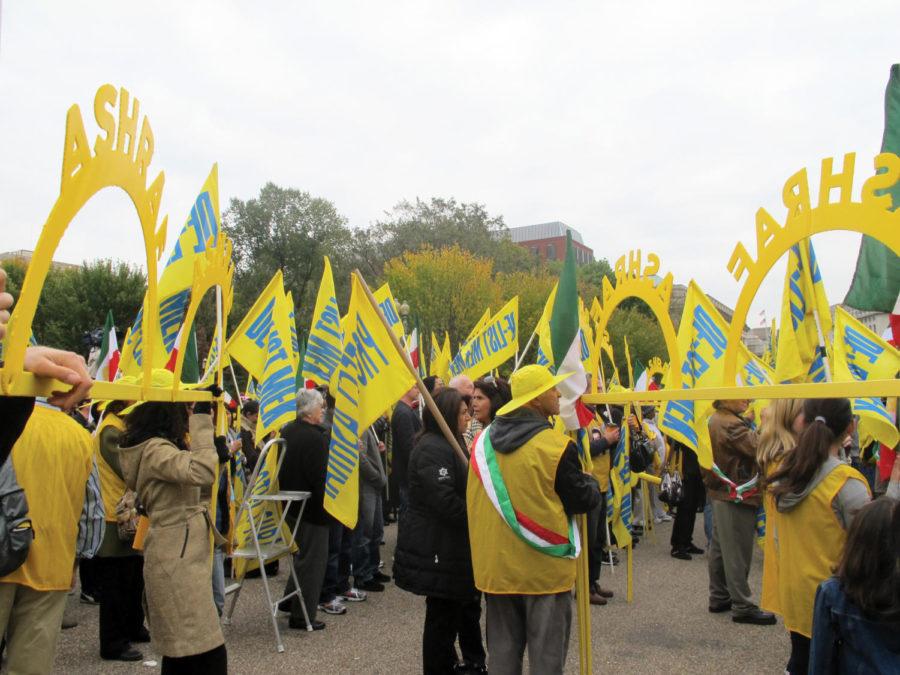Garcia-Merritt: Is the United States the good guy?
Iranian-Americans from across the country rally outside the White House on Saturday, October 22, 2011 to urge the administration to support regime change in Iran. They want the State Department to remove the MEK, or Mujahedin-e Khalq Organization, from the State Department’s Foreign Terrorist Organizations list.
December 13, 2012
I believe that by and large, Americans are good people.
Then again, I also believe that by and large, most Russians, Vietnamese, Kenyans, Israelis and Palestinians are good people.
People are one thing, but the governments that they control (or that control them, as the case may be), are a very different matter. Every government has corruption; every country has policies that are unfair or unequal and yet remain.
These unfair or unequal policies are a fact of life; for some, they are a fact of death.
What I mean by that is that things like supporting governments abroad that repress, violate, and treat their populations with violence show in many ways the differences that exist between American people and the U.S. government.
Perhaps an example would help to illustrate what I am talking about. In 2011, many Middle Eastern countries experienced what outside media sources such as CNN, Fox News, and many others have called the “Arab Spring”: a series of popular movements seeking to bring about social and political change.
In places like Egypt, Libya, Syria or Bahrain, people have revolted against their governments. Several of these governments have been “allies” of the United States in the region, and as such they have received American weapons, technologies and money.
You might be asking yourself, “OK, so why should I care? I’m in Iowa, and that’s all very far from me.”
The reason that this should matter to us is because if we don’t stop it before it happens, the consequences will haunt us. Since the end of World War II, the United States has supported or put in power regimes all over the world; these regimes are friendly to U.S. interests abroad (military, political, economic or otherwise). In many cases, these regimes get out of hand, and the United States sees itself either supporting a clearly unpopular, illegitimate government, or having to remove a loose end.
Take for example,U.S. involvement in Iran. During the Cold War, the United States supported the king, or Shah, as he was known within his own country. The Shah’s popularity was low, and he was deposed in a revolution that brought about the Islamic Republic that has grown to be a thorn in the side of American foreign policy in the Middle East.
Unfortunately, the Shah is not the only example of a U.S.-supported leader who has become an embarrassing liability. Manuel Noriega (former leader of Panama), Saddam Hussein (former leader of Iraq), Hosni Mubarak (former president of Egypt), and the Taliban (supported by Ronald Reagan during the Russian invasion of Afghanistan and now our current enemies) are all examples of groups or individuals that have been deposed through either popular action or U.S. intervention.
Who determines that these regimes act poorly? A cursory glance at this rouge’s gallery should be enough to convince anyone that these do not exactly qualify as the nicest crowd.
Noriega was controlling the drug trade through Panama and allied with Pablo Escobar and the Medellín cartel, smuggling cocaine north to the United States. Sadam Hussein started as a U.S. ally in the region but fell out of favor when he invaded Kuwait and also due to actions against his own people, such as the use of chemical weapons. Both Noriega and Hussein were taken out of power through U.S. military intervention, in which American servicemen and women died.
Mubarak was considered a key ally of the United States, and his government received plenty of American-made weaponry; this weaponry was turned on his people during the uprisings, which ultimately proved successful in removing him from power.
The Taliban were once supported as anti-communist allies, and were referred to as Mujahideen. Among these “freedom fighters” was a man who would become the United States’ most vivid reminder of what happens when the wrong people are supported. That man, Osama bin Laden, would go on to orchestrate attacks against U.S. citizens around the world.
For a country that takes pride in calling itself a democracy, and makes a big show every four years when the elections come around, the United States sure does have a knack for picking some of the worst possible people as allies and friends.
So why should we care? I think it is in every American’s interest to know what their government is doing abroad. If we do not put the next Manuel Noriega into power, perhaps our nation may not have such a large drug problem; maybe if we decide against putting a new Saddam Hussein into, the boy down the street won’t have to go to war and face danger. Maybe if we skip the next coup or the next invasion, and let other people decide their own paths, we can live in peace.
Maybe we should live and let live?







